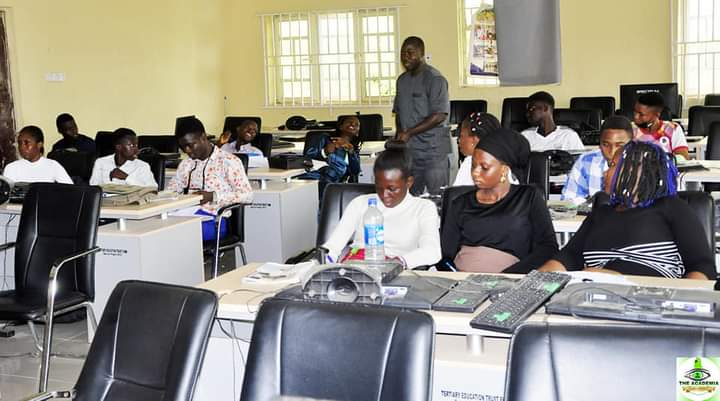Thirty campus journalists and members of the Academia Campus Journalists, the supreme press club of Center for Degree Programs at the Federal College of Education (FCE), Abeokuta, Ogun State, in affiliation with the University of Ibadan have been trained on the emerging trends of journalism including solutions journalism and fact-checking.
The maiden seven-day training with the theme ‘Incorporating your Degree with your Passion’ was organised for members of the association between November 1 to November 7, 2021.
The training is in line with the association motto ‘setting worthwhile standard’ and slogan ‘informing individual, reforming the nation’.
Facilitators at the training included Daud Olatunji of The Punch who trained the students on the rudiments of ‘The Reporting Value Chain’, Kabir Adejumo of HumAngle, ‘Principles of Investigative Journalism’, Sodiq Ojuroungbe of Platform Times, ‘Principles of Fact Checking’, Oluwayemisi Shofoluwe – PRO FCE, Abeokuta, ‘The Campus Ecosystem’, Ifedayo Ogunyemi of the Nigerian Tribune, ‘Principles of Solutions Journalism’, while Olamide O. Abe and Esther Popoola spoke on ‘Website Management’ and ‘Transcription’ respectively.
With almost 20 years of experience as a practising journalist, Olatunji extensively discussed the rubrics of journalism writing techniques and responsible reporting.
He noted the 5W and H as elements of journalism, ten basic news writing skills, tips to writing a news report, personality test for all journalists and ended with a practical session where everything taught were put to practice.
Read Also African newsrooms priotising solutions journalism
Delving deeper into the training on the second day, Adejumo described investigative journalism as exposing facts the public needs to know but someone is trying to hide.
Adejumo further revealed the reason for investigative journalism, examples of issues to investigate, who to investigate, basic principles on how to investigate and others.
Ojuroungbe, on the third day, left the campus journalists marvelled at how amazing fact-checking could be, not leaving out the revelation that the main idea behind fact-checking is to hold whoever is being fact-checked accountable. He did not leave out practicals to explain in detail all that he had taught during the course of his presentation.
Day 4 could not have been better without a digression from the world of journalism by bringing to the realm the regulation of campus journalists by Shofoluwe who gave the campus journalists the privilege to ask questions regarding the campus and its environs, explaining in detail those things they needed to know and how campus journalism could be regulated on campus.
Unlike the previous days, the fifth day had in attendance the President and members of the Press Club, Moshood Abiola Polytechnic, Abeokuta, the President, National Association of Nigerian Campus Editors and Ogunyemi who trained campus journalists on solutions journalism.
He explained solutions journalism to be rigorous reporting about responses to social problems, noting that the ‘rigorous’ part of solutions journalism distinguishes it from PR.
Ogunyemi also shed light on the types of impostors that solutions journalism is not including hero worship, silver bullet, favour for a friend, think tank, the afterthought, instant activist.
While explaining from the Solutions Journalism Network (SJN) handbook, he stated the reasons for solutions journalism with emphasis on using solutions journalism to bring more effective strategies to a community’s attention.
It also prevents authorities from giving excuses for inaction, exposing an organization to a powerful idea that can transform its impact, changing a community’s conversation and official policy and re-imagining the status quo.
In the practical class, Ogunyemi harped on the four factors that characterise a solution journalism piece including response, evidence, insights and limitations while using a report published by the International Centre for Investigative Reporting (ICIR) as an example.
During the last two days of the training, they were trained on website management, control, launch and how to transcribe appropriately audio recordings from interviews.
Alamu Adedoyin, a poet who felt the need of attending the training said: “The journalism training was super amazing and I learnt a whole lot, especially how to incorporate my degree with my passion. More so, it is what you know and are passionate about that will make way and money for you. I specially appreciate the Academia for planning such a knowledge-filled programme without a dime.”
Esther Popoola, a member of the association said that if she had learnt all of what was taught during the training earlier, she would have become better in this field of journalism.
“How I wish I got to learn all of these earlier, I am sure that I would have been better in my publications. Nevertheless, all these I have learnt, I would begin to put into practice and become better,” she said.
Also, Hassan Abdulsallam of Moshood Abiola Polytechnic Press Club revealed that since they returned to school, his members have been compelling him to publish works on Sojo.
“Solution journalism is the new trend of making a great impact in society and the way of journalism, it’s a great pleasure to have another insight s from Mr. Ifedayo Ogunyemi about Sojo although he had trained me more virtually.
“Since the training, my members have been on my neck to start providing solutions to problems of the society.”
Anibule is the president of The Academia Campus Journalists

